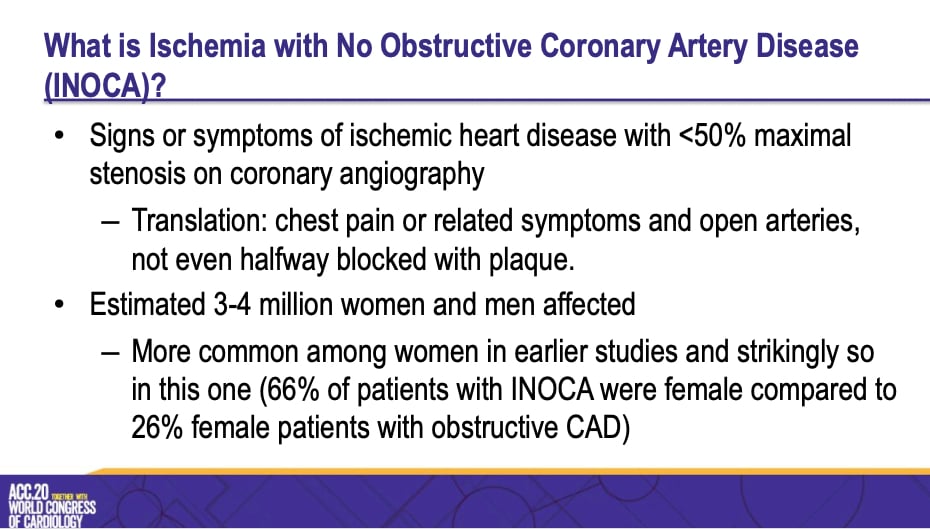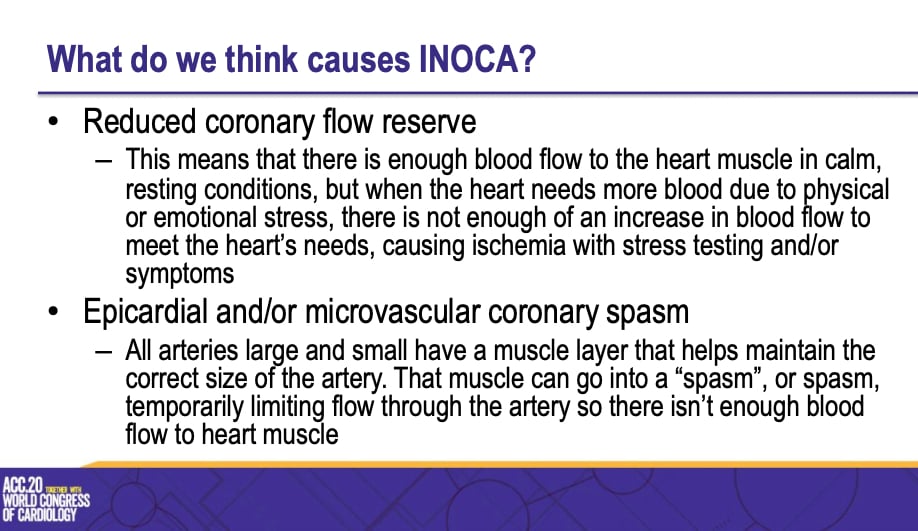An example of a coronary computed tomography angiography (CCTA) exam. The CIAO study looked at patients who have a problem of blood flow limitation and chest pain symptoms in the absence of a 50 percent or more artery narrowing, known as ischemia with no obstructive CAD, or INOCA.
April 3, 2020 — Patients who experience chest pain and have abnormal results on a cardiac stress test but who do not have blocked arteries often experience changes in their symptoms and stress test results over time, according to the CIAO Ancillary Study To The ISCHEMIA Trial presented at the American College of Cardiology (ACC) 2020 Annual Scientific Session.
“Even though these patients had very abnormal stress test results, symptoms and stress test findings often changed over time, and the change in the stress test and the change in the symptoms did not necessarily go together,” said Harmony R. Reynolds, M.D., director of the Sarah Ross Soter Center for Women’s Cardiovascular Disease at NYU Langone Health, New York and the study’s lead author. “The results suggest the disease activity ebbs and flows—there may be periods of time when symptoms are more active and times when they are absent.”
The study, called CIAO, enrolled 208 people who were screened for the ISCHEMIA Trial but did not have a blockage of more than 50 percent on a coronary angiogram, making them ineligible for the large international trial. ISCHEMIA assessed treatments for coronary artery disease (CAD), a buildup of plaque in the heart’s arteries.
The problem of blood flow limitation or heart symptoms in the absence of 50% or more artery narrowing is known as ischemia with no obstructive CAD, commonly referred to as INOCA. All patients had experienced chest pain or other heart-related symptoms (angina) and had abnormal results on a stress echocardiogram, a test in which a doctor uses ultrasound to image the heart before and after a patient exercises on a treadmill or stationary bike.

The researchers assessed participants’ symptoms and stress test results at one year and compared CIAO patients’ baseline findings to those of 1,079 patients who were enrolled in ISCHEMIA and had the same type of stress test used in CIAO, a stress echocardiogram. At baseline, they found that patients in CIAO and ISCHEMIA had similar amounts of ischemia on their stress tests despite patients not having obstructive CAD in CIAO. CIAO participants with INOCA had more frequent angina; 17% of these patients had angina weekly or more often, compared to 4% among those in ISCHEMIA with CAD. CIAO patients were also more likely to have angina in the last month; 41% of CIAO patients with INOCA reported no angina in the last month compared to 62% of ISCHEMIA patients with CAD.
At one year, half of CIAO patients’ stress echocardiograms became normal and 45% were the same as at baseline or worse. Angina symptoms improved in 42% and worsened in 14% and the number of medications to control angina on average remained the same. The change in stress test findings over one year and the change in symptoms over one year were not related to one another.
One notable difference from the ISCHEMIA trial was that 66% of patients enrolled in CIAO were female, a much larger proportion than in ISCHEMIA, in which only 26% of enrolled patients were female. That finding fits with previous studies that have found women are more likely to experience chest pain symptoms and have abnormal stress test results than men despite showing less extensive plaque buildup in the arteries.
“This could relate to fundamental differences in how heart disease develops in women and men,”Reynolds said. For example, prior studies have suggested women are more likely to experience small vessel disease, in which the smaller blood vessels restrict blood flow to the heart even if the main arteries are clear.
“The worry is that patients with INOCA will get the brush-off from doctors, who might believe patients are fine because their arteries are open,” Reynolds said. “However, they cannot be ignored. Prior studies show that these patients are at higher risk than people without angina, although they are generally at lower risk than those with obstructive CAD.”
In addition to small vessel disease, intermittent chest pain and ischemia could be caused by episodes of muscle spasms in the coronary arteries, Reynolds said. Further research is needed to determine the factors that contribute to such symptoms in the absence of CAD and determine appropriate treatment approaches, she said. The researchers plan to compare different heart disease assessment strategies to clarify how less invasive tests can be used to identify patients at higher risk.

The study was funded by the National Heart, Lung, and Blood Institute (NHLBI) of the National Institutes of Health (NIH).
Read the related sub-study article Sex Differences in Stress Test and CCTA Findings and Symptoms in the ISCHEMIA Trial, released just prior to ACC 2020.


 July 31, 2024
July 31, 2024 









